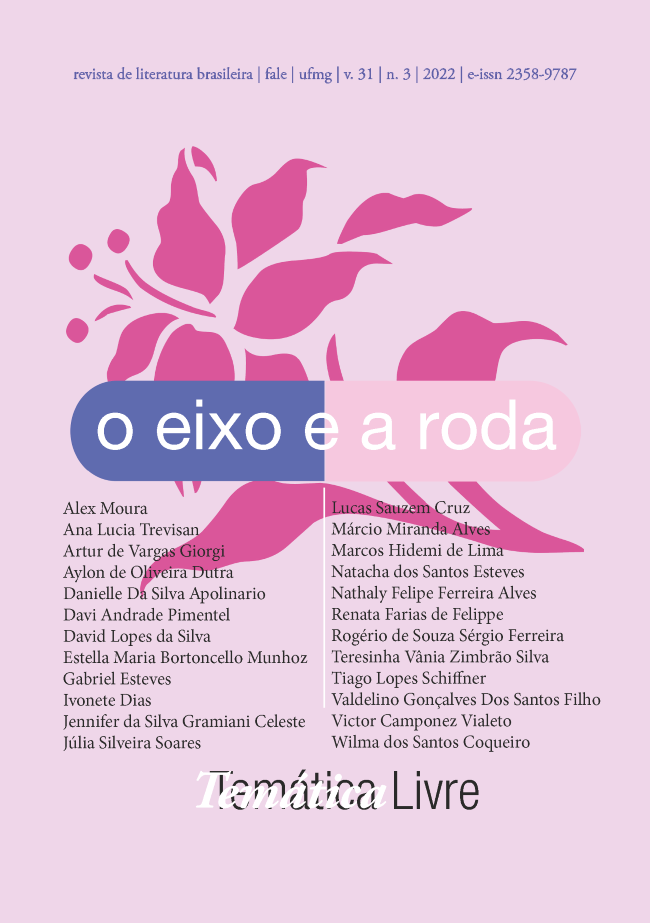Island Society
a Journey Between Grande Sertão: Veredas and Cabra Marcado para Morrer
DOI:
https://doi.org/10.17851/2358-9787.31.3.297-319Keywords:
Grande sertão, veredas, Cabra marcado para morrer, developmentalism, formal tensions, dialectical materialismAbstract
The objective of this study is to analyze the context of creation and the formal tensions present in Grande Sertão: Veredas and Cabra Marcado para Morrer. The intention is to highlight the similar narrative points - albeit with some different implications - between Cabra Marcado para Morrer, by Eduardo Coutinho, and Grande Sertão: Veredas, from Guimarães Rosa. The paper argues that these similarities are caused by the perspective of social integration from the 1950s and 1960s, which is hampered by the military coup of 1964. In this path, the conciliatory bias of the film is pointed out, its occurrence refers to the matrix of thought proper to developmentalism, with promises of integration related to the 1950s - which unleashes aesthetic proximity between the film record and one of the greatest works of Brazilian literature, not forgetting obviously the artistic particularities of these objects and their diverse results. Thus the purpose of this work is to investigate the formalization of the film in comparison with that of the novel and to examine how they incorporate the dilemmas they face in their periods of creation and respond to them. For this, the basic theoretical presupposition of the project is dialectical materialism, which equates the relation between literary form and social process.
References
ARAÚJO, H. V. A terceira margem sobre a qual se equilibra Riobaldo. In: ARAÚJO, H. V. Futuro pifado na literatura brasileira: promessas desenvolvimentistas e modernização autoritária. Porto Alegre, 2014. p. 85-95.
BOSI, A. Céu, inferno. In: BOSI, A. Céu, inferno. São Paulo: Duas cidades; Ed. 34, 2003. p. 19-50.
CALLADO, A. Quarup. Rio de Janeiro: Civilização Brasileira, 1978.
CANDIDO, A. O homem dos avessos. In: CANDIDO, A. Tese e antítese. São Paulo: T. A. Queiroz Editor, 2002. p. 119-139.
CONY, C. H. Pessach: a travessia. São Paulo: Record, 1997.
CABRA Marcado para Morrer (Eduardo Coutinho). [S. l.: s. n.], 2019. 1 vídeo (1:59 min). Publicado pelo canal Gameleira Filmes. Disponível em: https://www.youtube.com/watch?v=4-HBPSqqonU. Acesso em: 21 dez. 2022.
GLAUBER Rocha – Terra em Transe (1967) – [Multi Subs]. [S. l.: s. n.], 2015. 1 vídeo (1:48min). Publicado pelo canal Clássicos da Sétima Arte. Disponível em: https://www.youtube.com/watch?v=9oSR06dQGjY. Acesso em: 21 dez. 2022.
GRANDE Sertão Veredas: Eduardo Coutinho sobre Guimarães Rosa. [S. l.: s. n.], 2014. 1 vídeo (31 min). Publicado pelo canal ZekitchaCostello. Disponível em: https://www.youtube.com/watch?v=BSOQ7wAdSF8. Acesso: 20 dez. 2022.
COUTINHO, E. O olhar no documentário. In: LABAKI, A. (org.). A verdade de cada um. São Paulo: Cosacnaify, 2015.
DACANAL, J. H. Grande sertão: veredas. Romances Brasileiros III: contexto, enredo e comentário crítico. Rio Grande do Sul: Leitura XXI, 2013. p. 142-174.
LINS, C. Eduardo Coutinho, linguista selvagem do documentário brasileiro. Galáxia, São Paulo, n. 31, jan.-abr. 2016. Disponível em: https://www.scielo.br/scielo.php?script=sci_arttext&pid=S1982-25532016000100041. Acesso em: 15 out. 2019.
O DIA que Durou 21 Anos - Documentário Completo. [S. l.: s. n.], 2019. 1 vídeo (1:17min). Publicado pelo canal Desmistificando. Disponível em: https://www.youtube.com/watch?v=-fjwlN5s4vg. Acesso em: 21 dez. 2022.
OHATA, M. (org.). Eduardo Coutinho. São Paulo: Cosacnaify, 2013.
PACHECO, A. P. Lugar do mito: narrativa e processo social nas primeiras estórias de Guimarães Rosa. São Paulo: Nankin, 2006.
RAMOS, F. P. Mas afinal... O que é documentário? São Paulo: Ed. Senac, 2013.
ROSA, J. G. Grande sertão: veredas. Rio de Janeiro: Nova Fronteira, 2006.
ROSA, J. G. Primeiras estórias. Rio de janeiro: Nova Fronteira, 2005.
SANTA Marta: duas semanas no morro. [S. l.: s. n.], 2020. 1 vídeo (54 min). Publicado pelo canal Marcus Martins. Disponível em: https://www.youtube.com/watch?v=R5LJZ-EDWVU. Acesso: 21 dez. 2022.
SCHWARZ, R. O fio da meada. Novos Estudos Cebrap, São Paulo, n. 12, jun. 1985.
SCHWARZ, R. O pai de família e outros estudos. São Paulo: Companhia das Letras, 2008.
SCHWARZ, R. Sequências brasileiras. São Paulo: Companhia das Letras, 1999.
RAMOS, F. P. Mas afinal... O que é documentário? São Paulo: Ed. Senac, 2013.
VELOSO, C. Verdade tropical. São Paulo: Companhia das Letras, 1997.










